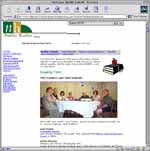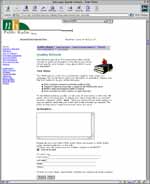Winter 2002
Civics Physics: Energy Matters in NH Effort
By Jon Greenberg
Senior Editor
New Hampshire Public Radio

Media collaborations are old hat but in New Hampshire, a different sort of partnership is taking shape.
The familiar faces of public radio and television and local newspapers form one branch of the partnership. A research arm draws on the skills of a public-policy center, a survey group and the state’s historical society and humanities council. And a citizen-participation arm pairs up a statewide leadership-training organization with a civic-deliberation center based at a private college.
Called the New Hampshire Civic Connection (NHCC), the group’s ambitious goal is to help re-engineer the dynamics of public-policy debate in the Granite State.
The long-term plan is to focus the resources of its eight members on one topic. For the past year, it has set its sights on our convoluted public schools debate. Public education is tough sledding for most lawmakers but in New Hampshire the question of how to pay for schools has collided with the state’s anti-tax traditions.
Many citizens have voiced frustration because the debate fails to address the question that ought to precede the money: What schools ought to offer children.
The Civic Connection is tackling education quality on several fronts. It decided first to shed light on a popular nostrum – the often-repeated finding that, despite public skepticism about education in general, most people are pretty satisfied with their local schools. The Civic Connection conducted a poll, which showed that, most of the time, satisfaction is based on inadequate information.
Blending the resources of three partners – the University of New Hampshire Survey Center, the New Hampshire Center for Public Policy Studies and New Hampshire Public Radio – the Civic Connection took responses from telephone interviews and compared them with the actual performance of the respondents’ school districts. Even allowing for testing inaccuracies, the results were striking. In school districts that ranked in the bottom third, half the people thought their schools were doing a good or excellent job. Among all respondents, a third had no idea how well their schools were doing and refused to guess. The October report laid the groundwork for new activities.
Over the next two years, the Civic Connection will conduct many distinct projects, including local forums about schools, a report to the legislature on how the public defines education quality, a lecture and discussion series on the historic roots of the state’s school policy debate and a glossary to bridge the gap between educators’ language and the public’s.
The group’s strength is the participants’ diversity, with each partner working at a different pace. That gets at the new physics of civic journalism.

The media organizations are fast-paced, daily news outfits. They are the high-frequency partners. At the other extreme is the New Hampshire Historical Society, which can spend 18 months on a single project – definitely low-frequency.
A long-lasting project that can accommodate quicker interim projects can meet the needs of all. But to keep the fast-paced organizations in sync with their more leisurely partners, the partnership needs nearly continuous updates.
Each separate project involves mini-partnerships among different members. The project’s results then become material for future collaborations.

For example, at a forum in Concord, a mayoral candidate said, “The one thing I hadn’t thought about a lot before is the talk that goes on between the schools and the community. It probably needs to be a lot better.” Afterward, he received an e-mail with a link to the NHCC report on what people don’t know about their schools. “Grist for my mill,” he responded.
Over the next six months, the Civic Connection plans to implement a community Web-publishing program created by the MIT Media Lab. As towns hold forums, participants can carry their discussions to the next step with occasional face-to-face meetings and with more frequent collaborative work online.
A simple idea guides partners’ contact with citizens: “There are no dead ends.” Every comment becomes part of the next project whether it’s a television report, a question on the next survey, a background paper to aid a future local forum or a report to the legislature.
The partnership’s breadth allows the Civic Connection to make good on its promise. It also allows the collaboration to reach citizens in a variety of ways – high-tech through the Web, medium-tech through broadcast or no-tech through face-to-face discussions.
Besides the service to citizens, the partners each benefit. The research partners get more exposure for reports. The civic deliberation partners gain clout being associated with a statewide effort. The media partners get first crack at the research and they forge a deeper relationship with people at the local level. If the new physics pays off, citizens will be better informed and the partners hope that better public decisions will result.
